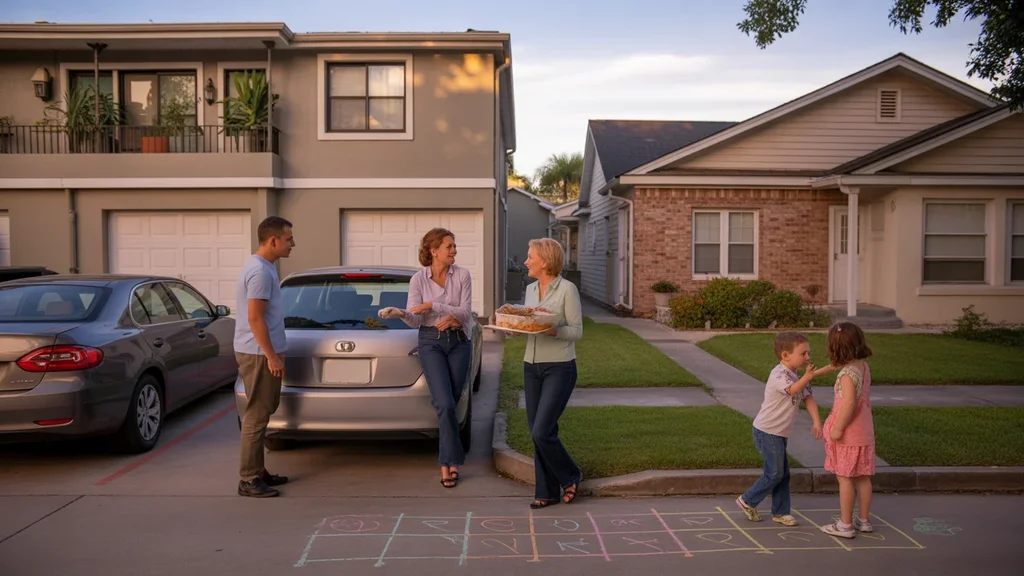
Renting vs. Owning in Orlando: What You’ll Pay
When deciding between renting an apartment or buying a house in Orlando, cost is a key factor. On average, renting a 2BR apartment in Orlando typically costs $1,800/month, while a 3BR house may cost $2,450/month. The average rent for a 3BR house in Orlando is $2,450/month. However, the cost of renting a 3BR house in Orlando has increased by 6% over the last year, with more affordable options in neighborhoods like Pine Hills and Rosemont.
Owning a home in Orlando comes with additional costs beyond the mortgage payment, such as property taxes, insurance, and maintenance. The median home price in Orlando is $385,000, which translates to a monthly mortgage payment of around $2,200 (assuming a 30-year fixed mortgage with 20% down). When factoring in other homeownership expenses, the total monthly cost of owning a house in Orlando is typically higher than renting an apartment.
Table: Cost Comparison – Apartment vs House
Here’s a side-by-side breakdown of common monthly costs in Orlando:
| Expense | 2BR Apartment | 3BR House |
|---|---|---|
| Rent/Mortgage | $1,800 | $2,200 |
| Utilities | $150 | $250 |
| Internet | $60 | $60 |
| Insurance | $20 (renters) | $150 (homeowners) |
| Maintenance | $0 | $200 |
| HOA | $0 | $250 |
| Total | $2,030 | $3,110 |
Estimates are for mid-range units with typical usage.
Utility and Upkeep Differences
Utility costs can vary significantly between apartments and houses in Orlando. Some key differences include:
- Water: Houses typically have higher water bills due to outdoor usage (lawns, pools) and more occupants.
- Electricity: Cooling costs are a major factor in Orlando. Houses generally have higher electric bills to cool more square footage.
- Lawn care: Homeowners must maintain their own yards, adding $100+ per month. Apartments include landscaping.
- HVAC maintenance: Houses require annual HVAC tune-ups (~$80) and repairs. Apartments handle this centrally.
Newer apartment complexes in Orlando often include trash and internet in the rent. For houses, these are additional monthly expenses. Homeowners must also budget for repairs like leaky faucets or broken appliances, while apartments typically cover these issues.
Lifestyle Tradeoffs
Beyond hard costs, there are lifestyle factors to consider when choosing between an apartment or house in Orlando. Apartments offer less space but more convenience – many are located in walkable areas near dining and shopping. They also require less upkeep, with no yard work or maintenance responsibilities.
Houses provide more privacy, space, and control over your environment. They’re ideal for families who need room to spread out or those who want a private outdoor area. Many Orlando residents choose apartments for walkability, while families prefer houses for yard space and privacy. Pet owners often favor houses to avoid apartment pet fees and restrictions.
Parking is another consideration – apartments typically offer just one or two spaces, while houses have private driveways and garages. However, homeowners are responsible for maintenance costs like driveway resurfacing. Some may prefer the convenience of an apartment near downtown, while others enjoy the extra space a house provides in the suburbs.
Which Is Cheaper Long Term in Orlando?
While renting is often cheaper in the short term, buying a house can be more economical over time. To illustrate, let’s compare the five-year cost of renting a 2BR apartment vs. owning a 3BR house in Orlando:
- Renting (2BR apartment): $2,030/month x 60 months = $121,800
- Owning (3BR house): $3,110/month x 60 months = $186,600
At first glance, owning is significantly more expensive. However, this doesn’t account for the equity you’re building as you pay down your mortgage. Assuming a 4% annual appreciation rate, your $385,000 Orlando house would be worth $467,000 after five years. Even after subtracting the total mortgage payments, you’ve gained $65,000 in equity.
Meanwhile, renters have no asset to show for their $121,800 in payments. And while homeowners’ monthly costs remain relatively stable, rents in Orlando have risen 15% in the past three years. In cities like Orlando, buying a home could be more economical over time, especially considering rising rents.
FAQs About Housing Costs in Orlando
How much more does a house cost per month?
In Orlando, owning a 3BR house costs about $1,080 more per month than renting a 2BR apartment when you factor in mortgage payments, insurance, maintenance, and utilities.
Do houses come with higher utility bills?
Yes, houses in Orlando typically have higher utility costs for electricity, water, and gas due to more square footage and outdoor upkeep. Expect to pay $100-$200 more per month compared to an apartment.
Are apartments cheaper even with pet fees?
While many Orlando apartments charge monthly pet fees (usually $20-$50), the overall cost is still typically cheaper than owning a house when you factor in other expenses like maintenance and higher utilities.
Making the Right Housing Choice in Orlando
Choosing between an apartment and a house in Orlando ultimately depends on your budget, lifestyle, and long-term goals. Renting is cheaper in the short term, with lower monthly costs and fewer responsibilities. However, buying a house can be a smart financial move in the long run, as you build equity over time.
To determine what you can afford, create a monthly budget that accounts for housing costs, utilities, and other expenses. Don’t forget to factor in additional costs of homeownership like property taxes and HOA fees.
Whether you choose to rent or buy, Orlando offers diverse housing options to fit a variety of budgets and preferences. By weighing the costs and lifestyle factors, you can find the perfect place to call home in The City Beautiful.
